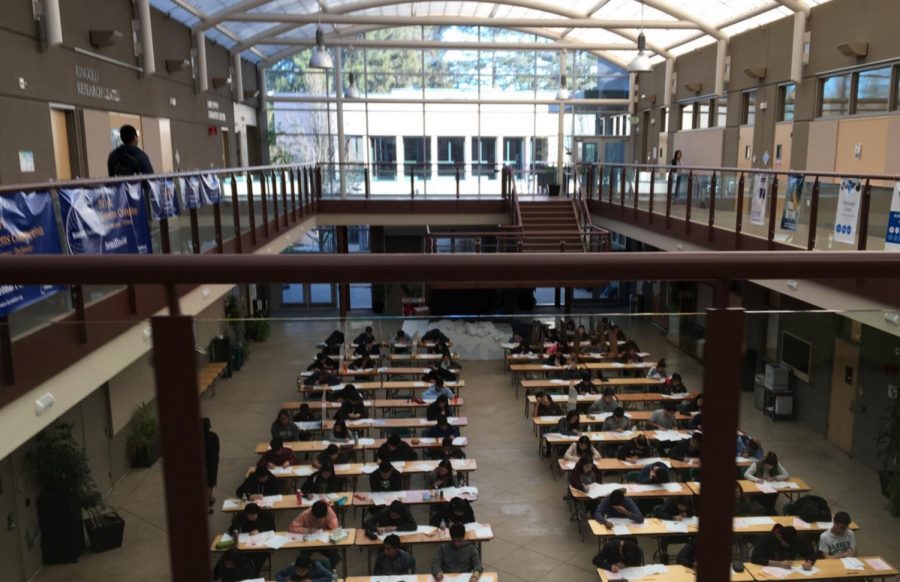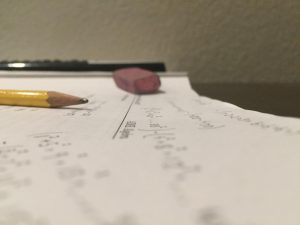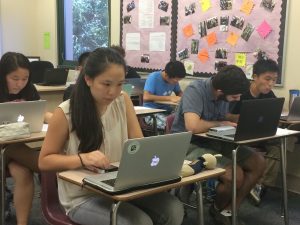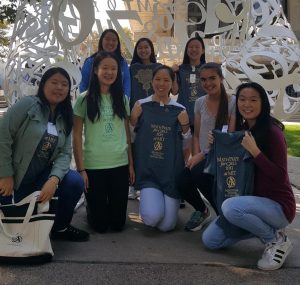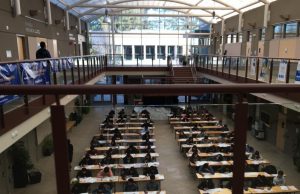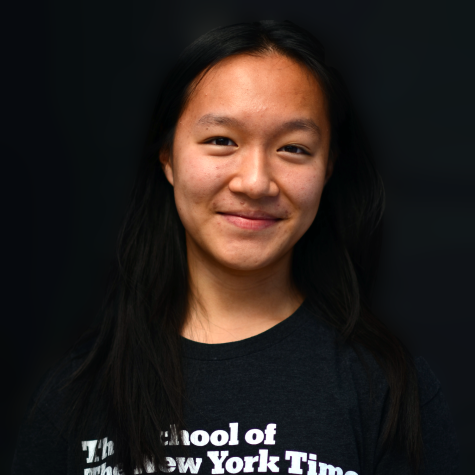Upper school students prepare for the AMC
Last year’s AMC 10 and 12 exams were held at 8 a.m. in Nichols Atrium on Feb. 20. According to Dr. Aiyer, around 120 students will be taking one of the exams this year, which will both be held next Thursday.
February 3, 2019
About 120 students will flow into the Nichols Atrium just before 8 a.m. next Thursday, finding their prescribed seat amid a wide array of the green fold-up chairs and wooden tables notoriously associated with major exams. At this time each year, varying combinations of nervousness and excitement often pervade the body of students who, armed with pencils, erasers, and the occasional water bottle, prepare for the upcoming 75-minute reason for the day’s shifted schedule: the American Mathematics Competition (AMC).
The 75-minute long AMC competitions contain 25 questions generally in order of increasing difficulty and come in three types: the AMC 8, the AMC 10, and the AMC 12. As suggested by the names, the AMC 8 is open for anyone in middle school and below, and the AMC 10 is open for sophomores and below while all students may take the AMC 12.
In preparation for the AMC and other math contests, Math Club has been hosting guest lectures since December presented by students and providing problem sets to help attendees hone their skills. They discuss topics often covered in the AMC competition, including algebra, geometry, probability and number theory.
For ways to study on your own, co-vice president Rishi Dange (11) suggests doing practice problems as well as reading math books.
“The thing that I mainly do is I take practice contests, old contests. On AOPS [the website Art of Problem Solving]. they have all those archives [of problems] so what I do is I look through those. If I don’t know a concept maybe I’ll read up a little bit on it,” Rishi said.
These methods help develop competitors’ problem solving skills and train their minds in efficiency and accuracy.
“Usually [the problems] require a little bit of speed [and some] creative insight or technique to simplify the problem and then answer it. That’s what the AMC is,” co-president of Math Club Kat Tian (12) said.
As for the night before the test, Math Club advisor and upper school math teacher Dr. Anu Aiyer believes that rest is of utmost importance.
“Do nothing. Get a good night’s sleep and eat a good breakfast and come,” Dr. Aiyer said with a smile.
For math enthusiasts, the AMC serves as a foundation and gateway for next-level math competitions, including the American Invitational Mathematics Exam (AIME) and the USA Mathematical Olympiad (USAMO) and Junior Mathematical Olympiad (USAJMO).
“The AMC is the base contest for math in high school. They’re basically so that the Math Association of America (MAA) can really … challenge top students to do their best and distinguish [them from others]. Because of that, it also leads to qualifications for later math competitions which are extremely prestigious and can even lead to people being invited to the USA National Math Team and even going to the international Math Olympiad,” new club member Rishab Parthasarathy (9) said.
On top of serving as a gateway to other higher-level math events, the AMC competitions are also an excellent opportunity for those simply searching for an opportunity to test their skills.
“[After] the first ten or so, the problems [in the AMC] become more theoretical and more interesting per se, so it’s a good way to test out how good you are in math in a short amount of time,” Rishi said. It’s not a huge commitment or anything, so I think it’s a good way to just have some fun and take a shot at something new.”
Unlike the courses that students take in high school, the AMC combines unique math concepts not commonly taught in one’s math class.
“[Problems are] interesting; they’re things that you typically don’t see in a math curriculum, so it’s really great for the students to get exposed to that. Even in Math Club, because we do so many competitions, I think it’s just really fun to see the students interact and talk about problems,” Dr. Aiyer said.
In addition to the AMC contest series, Math Club members will also be participating in a host of math competitions later in the spring, including the Stanford Math Tournament and the Bay Area Math Olympiad among others.




![LALC Vice President of External Affairs Raeanne Li (11) explains the International Phonetic Alphabet to attendees. "We decided to have more fun topics this year instead of just talking about the same things every year so our older members can also [enjoy],” Raeanne said.](https://harkeraquila.com/wp-content/uploads/2025/10/DSC_4627-1200x795.jpg)


















![“[Building nerf blasters] became this outlet of creativity for me that hasn't been matched by anything else. The process [of] making a build complete to your desire is such a painstakingly difficult process, but I've had to learn from [the skills needed from] soldering to proper painting. There's so many different options for everything, if you think about it, it exists. The best part is [that] if it doesn't exist, you can build it yourself," Ishaan Parate said.](https://harkeraquila.com/wp-content/uploads/2022/08/DSC_8149-900x604.jpg)




![“When I came into high school, I was ready to be a follower. But DECA was a game changer for me. It helped me overcome my fear of public speaking, and it's played such a major role in who I've become today. To be able to successfully lead a chapter of 150 students, an officer team and be one of the upperclassmen I once really admired is something I'm [really] proud of,” Anvitha Tummala ('21) said.](https://harkeraquila.com/wp-content/uploads/2021/07/Screen-Shot-2021-07-25-at-9.50.05-AM-900x594.png)







![“I think getting up in the morning and having a sense of purpose [is exciting]. I think without a certain amount of drive, life is kind of obsolete and mundane, and I think having that every single day is what makes each day unique and kind of makes life exciting,” Neymika Jain (12) said.](https://harkeraquila.com/wp-content/uploads/2017/06/Screen-Shot-2017-06-03-at-4.54.16-PM.png)








![“My slogan is ‘slow feet, don’t eat, and I’m hungry.’ You need to run fast to get where you are–you aren't going to get those championships if you aren't fast,” Angel Cervantes (12) said. “I want to do well in school on my tests and in track and win championships for my team. I live by that, [and] I can do that anywhere: in the classroom or on the field.”](https://harkeraquila.com/wp-content/uploads/2018/06/DSC5146-900x601.jpg)
![“[Volleyball has] taught me how to fall correctly, and another thing it taught is that you don’t have to be the best at something to be good at it. If you just hit the ball in a smart way, then it still scores points and you’re good at it. You could be a background player and still make a much bigger impact on the team than you would think,” Anya Gert (’20) said.](https://harkeraquila.com/wp-content/uploads/2020/06/AnnaGert_JinTuan_HoHPhotoEdited-600x900.jpeg)

![“I'm not nearly there yet, but [my confidence has] definitely been getting better since I was pretty shy and timid coming into Harker my freshman year. I know that there's a lot of people that are really confident in what they do, and I really admire them. Everyone's so driven and that has really pushed me to kind of try to find my own place in high school and be more confident,” Alyssa Huang (’20) said.](https://harkeraquila.com/wp-content/uploads/2020/06/AlyssaHuang_EmilyChen_HoHPhoto-900x749.jpeg)



